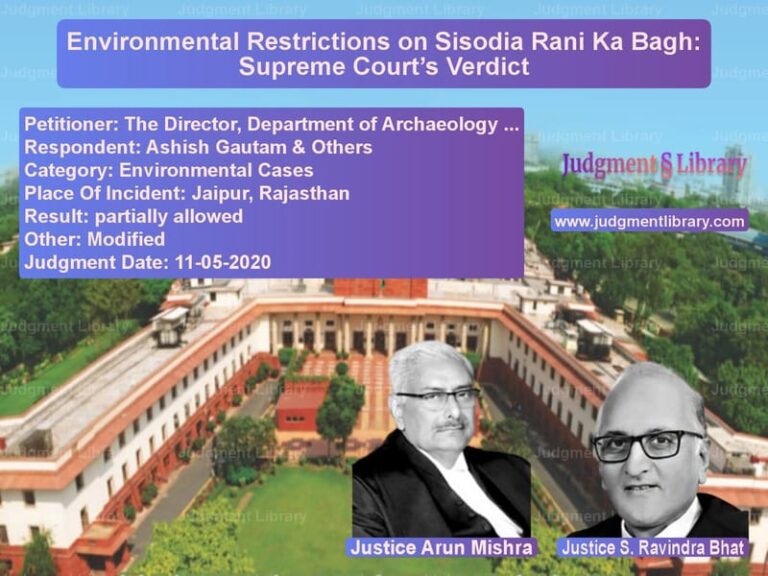Murder Conviction Overturned: Supreme Court Acquits Accused in Gujarat Case
The case of Prabhatbhai Aatabhai Dabhi vs. State of Gujarat revolves around the conviction and subsequent acquittal of the appellant, who was initially sentenced under Section 302 of the Indian Penal Code (IPC) for the alleged murder of Hukabhai. The Supreme Court ultimately ruled in favor of the accused, setting aside the conviction on grounds of insufficient evidence.
Background of the Case
The case dates back to November 12, 1997, when the deceased, Hukabhai, was last seen heading toward his field. The prosecution claimed that the appellant, Prabhatbhai Aatabhai Dabhi, followed him carrying a bamboo stick and later returned, allegedly confessing to the crime before multiple witnesses. Based on this, he was charged under Section 302 IPC (punishment for murder).
The trial court found the accused guilty, and this conviction was upheld by the Gujarat High Court. However, when the matter was taken to the Supreme Court, several discrepancies in the prosecution’s evidence came to light, leading to the appellant’s acquittal.
Petitioner’s Arguments
The appellant, Prabhatbhai Aatabhai Dabhi, argued:
- The alleged extra-judicial confession was unreliable as it was made to the brother of the deceased (PW-2) and a close acquaintance (PW-3), individuals who were unlikely to inspire confidence in the accused.
- The prosecution’s case was inconsistent—while PW-2 and PW-3 stated that the accused had a bamboo stick, the forensic evidence pointed to an axe as the weapon of attack.
- The bloodstains on the appellant’s clothing did not match the deceased’s blood group.
- The prosecution failed to recover the bamboo stick, the alleged weapon as per witness testimonies, further weakening the case.
- The appellant had already served over 11 years in prison, and there was no concrete evidence proving his guilt beyond a reasonable doubt.
Respondent’s Arguments
The State of Gujarat, representing the prosecution, countered:
- The accused had openly confessed to the murder before witnesses, a fact corroborated by multiple statements.
- The accused was seen following the deceased toward the field, indicating his involvement in the crime.
- The recovery of an axe allegedly used in the assault further strengthened the prosecution’s case.
- The presence of bloodstains on the accused’s clothes was suggestive of his involvement.
Key Legal Issues Considered
1. Admissibility of Extra-Judicial Confession
The Court examined whether the alleged confession was credible. Generally, an accused would confide in someone they trust, not the victim’s relatives. The Court found that the confession was unlikely to have been made in the manner alleged.
2. Conflict Between Witness Statements and Forensic Evidence
The witnesses claimed that the accused carried a bamboo stick, yet the forensic evidence suggested the use of an axe. This contradiction cast doubt on the prosecution’s claims.
3. Bloodstain Analysis
The forensic report revealed that while the deceased’s blood group was ‘O’, the blood found on the accused’s clothing was of ‘A’ group. This contradiction further weakened the prosecution’s case.
Supreme Court’s Verdict
The Supreme Court ruled in favor of the appellant, making the following observations:
- The alleged confession lacked credibility, as it was made before individuals closely related to the victim.
- Contradictions between the weapon described by witnesses and the actual weapon recovered rendered the prosecution’s claims unreliable.
- The bloodstains found on the accused’s clothing did not match those of the deceased.
- The prosecution failed to prove its case beyond a reasonable doubt.
As a result, the Court set aside the appellant’s conviction, stating:
“On all counts, the prosecution has failed to establish the guilt of the appellant beyond a reasonable doubt.”
Key Takeaways from the Judgment
- Extra-Judicial Confession Must Be Reliable: The Court emphasized that a confession made to the victim’s family members is not necessarily trustworthy.
- Consistency in Witness Testimony and Forensic Evidence is Crucial: When witness accounts contradict forensic findings, the prosecution’s case weakens.
- Prosecution Must Prove Guilt Beyond Reasonable Doubt: Mere suspicion is not enough; the prosecution must present solid evidence.
- Judicial Scrutiny is Essential in Long-Term Convictions: The Court took into account the appellant’s prolonged incarceration and the lack of conclusive evidence.
This ruling reinforces the principle that the burden of proof lies on the prosecution, and any inconsistencies in evidence can lead to acquittal.
Petitioner Name: Prabhatbhai Aatabhai Dabhi.Respondent Name: State of Gujarat.Judgment By: Justice Abhay S. Oka, Justice Pankaj Mithal.Place Of Incident: Gujarat.Judgment Date: 08-11-2023.
Don’t miss out on the full details! Download the complete judgment in PDF format below and gain valuable insights instantly!
Download Judgment: prabhatbhai-aatabhai-vs-state-of-gujarat-supreme-court-of-india-judgment-dated-08-11-2023.pdf
Directly Download Judgment: Directly download this Judgment
See all petitions in Murder Cases
See all petitions in Judgment by Abhay S. Oka
See all petitions in Judgment by Pankaj Mithal
See all petitions in allowed
See all petitions in Quashed
See all petitions in supreme court of India judgments November 2023
See all petitions in 2023 judgments
See all posts in Criminal Cases Category
See all allowed petitions in Criminal Cases Category
See all Dismissed petitions in Criminal Cases Category
See all partially allowed petitions in Criminal Cases Category







